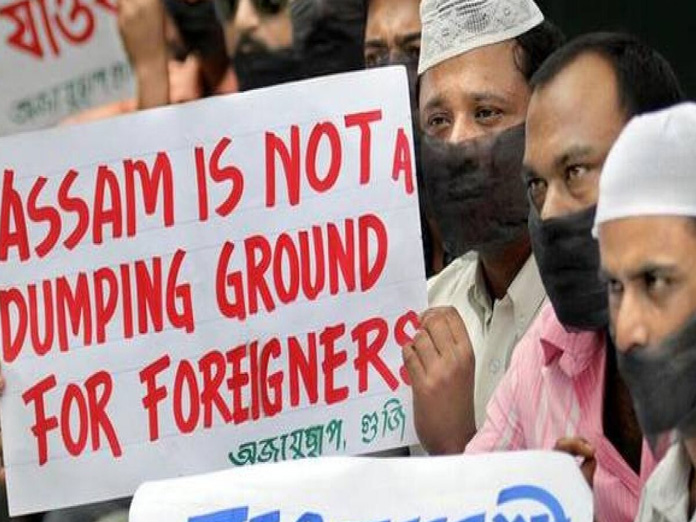Live
- RG Kar tragedy: Former SHO of Tala PS moves Calcutta HC for bail
- World Boxing backs plan to create a new Confederation in Asia
- Shubham Nigam: Transforming SaaS Growth Marketing with AI
- Convert those starts: Hemp wants Bangladesh batters to score big in second Test vs West Indies
- Grand Pushpayagam Celebrated at Venkanna Temple
- MLA Kuchukulla Rajesh Reddy Inspects Markandeya Lift Irrigation Project
- Government Committed to Village Development: MLA Dr. Rajesh Reddy
- Scientists Awareness on Natural Farming for Farmers
- Bavuma, Jansen, Coetzee return to playing XI for Test series opener against Sri Lanka
- CM’s post: Shiv Sena bats for Eknath Shinde, BJP pitches for Devendra Fadnavis
Just In

Students movements are synonymous with Assam Indias northeastern state witnessed the worlds longest such movement between 1979 and 1985 when lakh of students took to the streets seeking detection and deportation of illegal foreigners in the state
Students' movements are synonymous with Assam. India's northeastern state witnessed the world's longest such movement between 1979 and 1985 when lakh of students took to the streets seeking detection and deportation of illegal foreigners in the state.
The movement, known as 'Asom Andolan' (Assam movement), was supported by almost all sections of society due to the illegal influx of foreigners from Bangladesh which had threatened the demography of the state.
Thirty-three years after the Assam Movement, the state is witnessing yet another agitation of similar magnitude against the Central government's move to pass and implement the Citizenship (Amendment) Bill 2016, a contentious measure that seeks to grant citizenship to the persecuted non-Muslims from Bangladesh, Afghanistan and Pakistan.
"Our state has witnessed several movements in the past. But this is perhaps the biggest one after the Assam Movement. People are coming out on the streets on their own, opposing the Bill. There are protests in some parts of the state every day," said Lachit Bordoloi, a human rights activist and a member of the Asom Gana Parishad (AGP), who had closely witnessed the Assam Movement.
"One has to see the reach of the movement. People from all walks of life are coming out to oppose the Bill and if the government has failed to understand this, then it's unfortunate," Bordoloi said. Although other northeastern states, including Meghalaya, Mizoram, Manipur, Nagaland, Arunachal Pradesh and Tripura, have long been opposing the Citizenship Bill, the movement gained momentum after January 2019 when the Lok Sabha passed the measure.
There is no difference between the movement of 1979 and the movement now, albeit one: while the 1979 movement was restricted to Assam, the present agitation has drawn a near-total response from the six other states of the region as well.
While a series of protests in the form of demonstrations, standing nude in public places, shouting slogans or waving black flags at Assam government ministers and leaders of the ruling BJP-led dispensation at Dispur have become the order of the day in Assam, mass protests against the Bill have also rocked six other states in the recent past.
When Prime Minister Narendra Modi addresses public rallies in Assam, Tripura and Arunachal Pradesh on Saturday to inaugurate different developmental programmes, he will also be facing an Assam bandh called by the Tai Ahom Youth Parishad, Assam (TAYPA), a youth organisation of Tai Ahom communities that has a strong influence in Tai Ahom dominated districts of eastern Assam.
The bandh is also supported by two prominent organisations - the Krishak Mukti Sangram Samiti (KMSS) and the Asom Jatiyatabadi Yuba Chatra Parishad (AJYCP). The All Assam Students' Union (AASU) that had spearheaded the movement in 1979, has also decided to oppose Modi's visit on Saturday. While the Prime Minister will be addressing a public rally, AASU members will stage protests in all districts and sub-divisional headquarters.
"We are going to stage protests against the Citizenship Bill tomorrow (Saturday). While our members will stand with black flags in different public places across the state, they would also burn effigies of the Prime Minister and copies of the Citizenship (Amendment) Bill 2016 to mark their protest," AASU adviser Samujjal Bhattacharyya said at a press conference on Friday.
"The BJP has got the Bill passed in the Lok Sabha ignoring the protests of the people of Assam and the North-East. We are not going to accept this Bill at any cost and we are bound to organise a greater movement in the days to come to oppose the Bill," Bhattacharyya added. The AASU agitation is also supported by North East Students' Organisation (NESO) and 70 other tribal organisations in the state.
(Anup Sharma can be reached at [email protected])

© 2024 Hyderabad Media House Limited/The Hans India. All rights reserved. Powered by hocalwire.com







